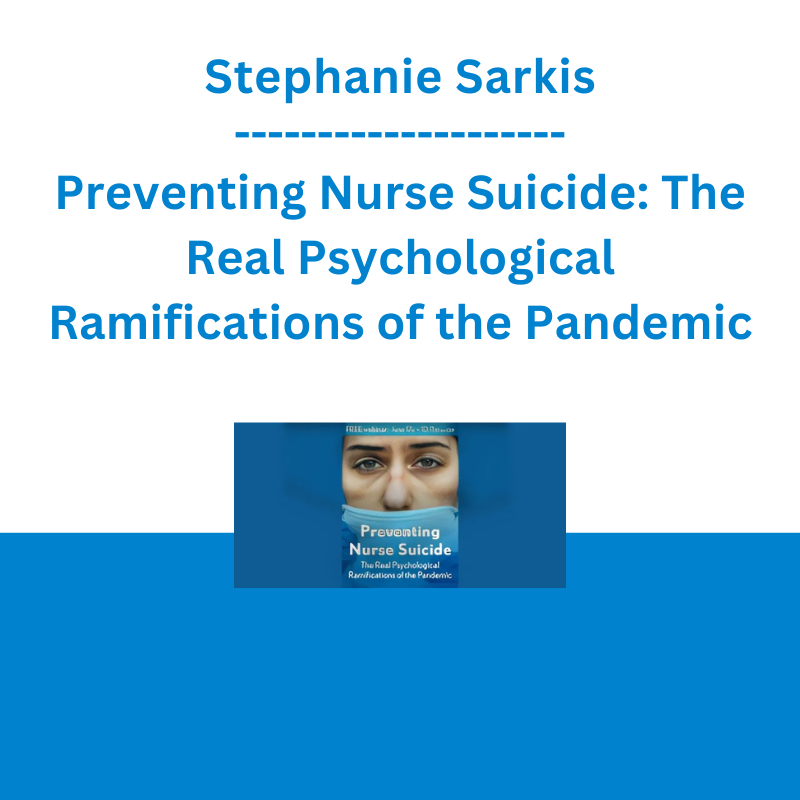*** Proof of Product ***
Exploring the Essential Features of “Stephanie Shafer – Preventing Nurse Suicide: The Real Psychological Ramifications of the Pandemic”
Speaker:Stephanie L. Shafer, MSN, ANP-BC, PMHNP-BC
Duration:1 Hour 23 Minutes
Format:Audio and Video
Copyright:Jun 17, 2021
Media Type:Digital Seminar
Description
Nursing has never been for the faint of heart, but the pandemic took our experiences to a whole new level.
This past year, we have been hailed as heroes and along the way have endured much grief, loss and challenge. Fortunately, our work worlds are feeling normalcy returning. But that does not mean that the traumatic events we experienced have eased from our memories. In fact, maybe the difficult moments just keep replaying. For yourself. For your co-workers. You know something must change but don’t know how to get started healing.
The unresolved emotions can feel exhaustive. The burnout and compassion fatigue have felt heavy, leaving many nurses at a point where they feel both emotionally and physically drained. Many of us are searching for answers that go well beyond self-care. If we fail to recognize these feelings, they can lead to depression, anxiety, fatigue, somatic symptoms, and even nurse suicide.
It’s my goal to make sure that this Preventing Nurse Suicide information gets out to as many nurses as possible. I want to be able to start these difficult conversations and contribute to the solutions.
We really need to feel empathy and compassion towards one another, as we all deal with such extreme stressors. If we learn new ways to accept and nurture each other, we can develop a built-in support system on our units and floors. NOW is the time to come together as a family of nurses. I don’t want you to feel alone in this struggle.
As a community across the country, let’s support one another through our shared patient experiences.
Stephanie L. Bunch, RN, MSN, ANP-C, PMHNP-C,
and the PESI HealthCare Team
Speaker
Stephanie L. Shafer, MSN, ANP-BC, PMHNP-BC, works in a large private practice in Lansing, MI, providing clinical services to children, adolescents, and adults with psychiatric disorders, including ADHD, Bipolar Disorder, Depression, Anxiety, Obsessive-compulsive tendencies, Schizophrenia, Autism Spectrum Disorder, Traumatic Brain Injury, PTSD, and Personality Disorders. She has achieved considerable success treating these conditions. This success has largely resulted from the development of a structured model of care that includes a significant focus on clinical and background histories, identifying psychosocial stressors, and evaluating prior medical and psychiatric diagnoses (and treatment regimens associated with these conditions). This approach and model of medical management is essential to the effective delivery of psychiatric medications to this population.
From a clinical perspective, Stephanie has worked in a myriad of settings, including emergency medicine, primary care, and psychiatry, within a large urban hospital, community-based practice, clinics, and in a private-practice setting. Her transition from primary care to psychiatry evolved as a means of providing effective treatment for a growing population of underserved patients with psychiatric disorders.
Stephanie’s commitment to her specialty is evident. She completed a post-graduate degree specializing in psychiatry at Johns Hopkins University in Baltimore, MD, earned her Psychiatric Mental Health Nurse Practitioner certificate, and is a requested presenter, sharing her expertise with multidisciplinary healthcare audiences throughout the country.
Speaker Disclosures:
Financial: Stephanie Shafer is the owner and founder of Neurobehavioral Health and Wellness. She receives a speaking honorarium and recording royalties from PESI, Inc. She has no relevant financial relationships with ineligible organizations.
Non-financial: Stephanie Shafer is a member of the American Association of Nurse Practitioners.
Target Audience
- Nurses
- Nurse Practitioners
- Clinical Nurse Specialists
- Nurse Educators
- Other Healthcare Professionals
Outline
Preventing Nurse Suicide: What We Are Learning
- Nationwide statistics vs worldwide
- Lack of statistics – and potential reasons for this
- Statistics regarding mental health history among nurses
Mental Health Concerns Among Nurses: Common Risk Factors
- Men vs Women- 93% of nurses worldwide are women
- The overwhelming need to care for everyone – except yourself
- Home stressors
-
- Relationship issues
- Drug abuse among family members, spouse, or self
- Strained familial dynamic
- Long and demanding work shifts
- Little recognition by employer and patients
- Workplace drama
- Mental health history- treated or undiagnosed
Burnout/Compassion Fatigue
- Differentiating the two
- Determining the source of the burnout
- How this pandemic has taken burnout to a new level
-
- Various traumas associated with the pandemic
- How nurses have dealt with these traumas
Nursing as a Culture
- Uniqueness of the overall culture of nursing
- Pre and post COVID – has COVID changed this?
- Understanding the trauma experienced from the pandemic
Solutions for Compassion Fatigue, Burnout, and Depression
- Prioritizing your own health
- Removing the stigma towards mental health
- Empathy for colleagues – and patients
- Use your voice to address workplace concerns
- Strategies to initiate change on your unit
Objectives
- Analyze the prevalence and statistics associated with suicide and mental health issues among nurses.
- Demonstrate understanding of compassion fatigue/burnout and their potential ramifications.
- Determine the traumatic nature of this pandemic and the potential long- and short-term ramifications of repeated exposure.
- Assess the ways this pandemic has changed how we view the healthcare system and our role as nurses.
- Apply implementable strategies to overcome burnout and improve quality of life for yourself or at-risk co-workers.
Please see the full list of alternative group-buy courses available here: https://lunacourse.com/shop/









